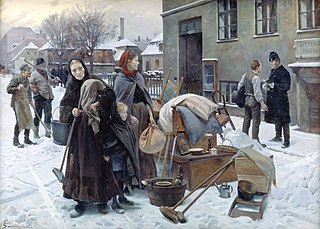Contents


A megacity is a very large city, typically with a population of more than 10 million people. The United Nations Department of Economic and Social Affairs in its 2018 "World Urbanization Prospects" report defines megacities as urban agglomerations with over 10 million inhabitants. A University of Bonn report holds that they are "usually defined as metropolitan areas with a total population of 10 million or more people". Elsewhere in other sources, from five to eight million is considered the minimum threshold, along with a population density of at least 2,000 per square kilometre. The terms conurbation, metropolis, and metroplex are also applied to the latter.

A slum is a highly populated urban residential area consisting of densely packed housing units of weak build quality and often associated with poverty. The infrastructure in slums is often deteriorated or incomplete, and they are primarily inhabited by impoverished people. Although slums are usually located in urban areas, in some countries they can be located in suburban areas where housing quality is low and living conditions are poor. While slums differ in size and other characteristics, most lack reliable sanitation services, supply of clean water, reliable electricity, law enforcement, and other basic services. Slum residences vary from shanty houses to professionally built dwellings which, because of poor-quality construction or lack of basic maintenance, have deteriorated.

Nigeria is a federation of 36 states, each of which is a semi-autonomous political unit that shares powers with the federal government as enumerated under the Constitution of the Federal Republic of Nigeria. In addition to the states, there is the Federal Capital Territory (FCT), in which the capital city of Abuja is located. The FCT is not a state, but a territory of the federal government, governed by an administration headed by a minister. Each state is subdivided into local government areas (LGAs). There are 774 local governments in Nigeria. Under the Nigerian Constitution, the 36 states enjoy substantial autonomy but are not sovereign entities, as ultimate authority lies with the federal government. Amendments to the constitution can be proposed by the National Assembly, but for an amendment to be valid, it must be approved by a two-thirds majority of the 36 state legislatures, as required under Section 9 of the 1999 Constitution of Nigeria.

Eviction is the removal of a tenant from rental property by the landlord. In some jurisdictions it may also involve the removal of persons from premises that were foreclosed by a mortgagee.

A shanty town, squatter area,squatter settlement, or squatter camp is a settlement of improvised buildings known as shanties or shacks, typically made of materials such as mud and wood, or from cheap building materials such as corrugated tin sheets. A typical shanty town is squatted and in the beginning lacks adequate infrastructure, including proper sanitation, safe water supply, electricity and street drainage. Over time, shanty towns can develop their infrastructure and even change into middle class neighbourhoods. They can be small informal settlements or they can house millions of people.

Slum clearance, slum eviction or slum removal is an urban renewal strategy used to transform low-income settlements with poor reputation into another type of development or housing. This has long been a strategy for redeveloping urban communities; for example, slum clearance plans were required in the United Kingdom in the Housing Act 1930, while the Housing Acts of 1937 and 1949 encouraged similar clearance strategies in the United States. Frequently, but not always, these programs are paired with public housing or other assistance programs for the displaced communities.

Victoria Island (VI) is an affluent area that encompasses a former island of the same name neighbouring Lagos Island, Ikoyi and the Lekki Peninsula by the Lagos Lagoon. It is the main business and financial centre of Lagos State, Nigeria. Victoria Island is one of the most exclusive and expensive areas to reside in Lagos. The town and island lie within the boundaries of the Eti-Osa Local Government Area (LGA).

Ikoyi is the most affluent neighborhood of Lagos, located in Eti-Osa Local Government Area. It lies to the northeast of Obalende and adjoins Lagos Island to the west, and at the edge of the Lagos Lagoon. Popular with the extreme upper class residents of Nigerian society, Ikoyi is arguably one of the wealthiest communities within Nigeria.

Yaba is a suburb located on Lagos Mainland, Lagos in Lagos State, Nigeria. With its educational institutions and technological start-ups, Yaba is considered the technological hub of Lagos. Inaugurated in 2021, the ultra-modern Mobolaji Johnson Central Station in Yaba connects Lagos with the country's third largest city, Ibadan, via one of the few standard-gauge railway lines in Africa. The bus station in Yaba stands out with its tent-like architecture. Yaba's market, especially around Tejuosho, is known as "the shopping centre of Lagos".

The vice president of Nigeria is the second-highest official in the executive branch of the federal government of Nigeria, after the president of Nigeria, and ranks first in the presidential line of succession. Officially styled vice president of the Federal Republic of Nigeria, the vice president is directly elected together with the president to a four-year term of office.

Makoko is an informal settlement across the 3rd Mainland Bridge located on the coast of mainland Lagos, Nigeria. A third of the community is built on stilts along the lagoon and the rest is on the land. The waterfront part of the community is largely harboured by the Egun people who migrated from Badagary and Republic of Benin and whose main occupation is fishing.

GraceLand is a 2004 novel by Chris Abani, which tells the story of a teenager named Elvis, who is trying to get out of the ghettos of Lagos, Nigeria. Chris Abani depicts the poverty and violence in Lagos and how it affects the everyday lives of Elvis and his family. Having emigrated from Nigeria himself as a result of the Biafran War, Abani's novel touches on many issues relevant to corruption, poverty, and violence within the country. Elvis's story also touches on issues related to globalization, and how Nigeria's impoverished communities are affected by this phenomenon. The main focus of this story is on Elvis and how he survives in the often harsh environment that is Nigeria's largest city; Elvis himself is a complex and sympathetic character who clearly cares for his family despite a turbulent upbringing. However, this is complicated by the numerous illegal and morally questionable jobs he takes part in with his friend Redemption.
The 1943 Chennai floods occurred during the annual northeast monsoon in Madras in India.

Premium Times is a Nigerian online newspaper based in Abuja, the capital of Nigeria. The newspaper was launched in 2011. The online medium is notable for investigative journalism and reports, among other fields.

Ojuju is a 2014 Nigerian zombie thriller film, written and directed by C.J. Obasi. The film which has a zero-budget, stars Gabriel Afolayan, Omowunmi Dada, and Kelechi Udegbe. It premiered at the 4th Africa International Film Festival, where it won the award for "Best Nigerian Movie".
The Lagos Food Bank Initiative (LFBI) was established to tackle hunger, reduce food wastage and provide emergency food solutions through its network of Food banks across Lagos State. LFBI aims to achieve its goals by creating, supplying, and strengthening new food banks in all the twenty (20) Local Governments Areas in Lagos State. LFBI works with religious organizations, corporate entities, and individuals to achieve their main objectives. LFBI's main targets are seniors aged 50 years and above; children aged 5–16 years; the vulnerable, the destitute; extremely indigent families and widows.

Squatting in Nigeria refers to a person who is not the owner, taking possession of land or an empty house. Squatters migrate from the countryside to informal settlements in cities such as Abuja, Port Harcourt and in particular Lagos. Lagos had a population of over 14 million people in 2019 and many slums, including Makoko.
Tunde Onakoya is a Nigerian chess player and coach, who holds the Guinness World Records for the longest marathon chess game. As the founder and covener of Chess in Slums Africa, he has organised a number of interventions for children across slums in Lagos state including Majidun (Ikorodu), Makoko and recently, Oshodi.